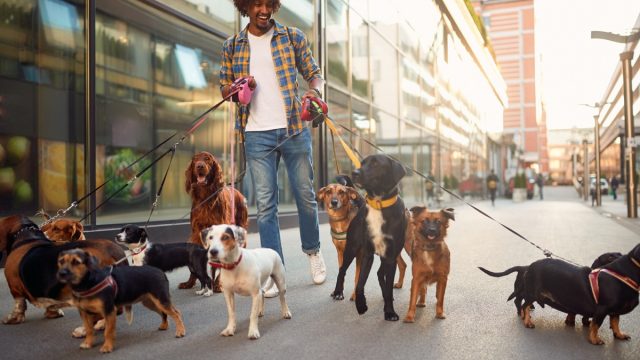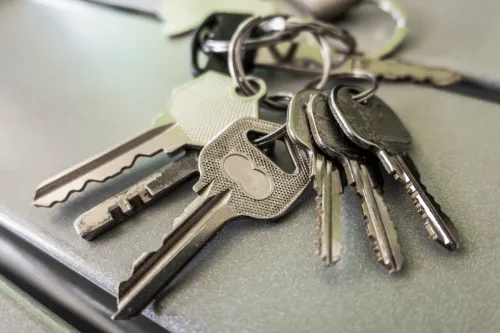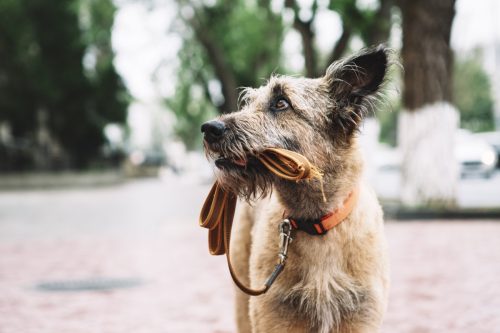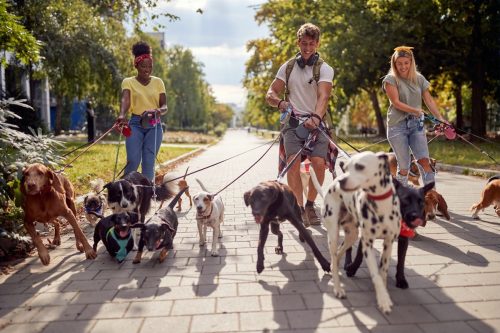5 Secrets From Former Dog Walkers

Few jobs are more misunderstood than the dog walker. On paper, it sounds like a dream. You get to hang out with dogs? For money? We agree: Where’s the sign-up list?! But as modern life has become more streamlined, so too has the dog-walking industry. Big money, the internet, and a number of booming apps have radically upended what used to be a neighborhood service. Keep reading for five secrets that peel back the curtain about what the dog-walking business is really like—directly from the folks who’ve walked the walk. These are important tidbits if you’re hiring a dog walker for your four-legged friend.
READ THIS NEXT: 5 Secrets Dog Groomers Won’t Tell You.
1
Dog-walking apps aren’t created equal.

The two most prominent apps for finding a dog walker are Rover and Wag. Think of them as the Uber and Lyft for dog-walking services. You’ll find talented, devoted dog lovers on both platforms, of course. But like their rideshare counterparts, one is generally considered superior.
Rover operates a bit more like a social network, facilitating connection and conversation between the owner and the walker. Wag, on the other hand, limits exchanges to the fundamental details—not ideal for a service that requires you to trust your best friend in the hands of a stranger.
“I am strongly biased toward Rover,” one dog walker—who sources work through both platforms—said in an Ask Me Anything session on Reddit under the username __Pupperoni__. “I believe it is better for both [the] walker and [the] owners. If I had a dog, I would have no qualms about using Rover, but I would not use Wag.”
2
Walkers are surprised at how trusting you are.

Dog walking offers a curious proposition. By the gig’s nature, you’re letting someone directly into your personal life. Most humans are generally good people, but it takes time to build trust. After all, the vetting processes for Wag and Rover aren’t exactly NSA-tier background checks.)
“I’m a dog walker and I’m often surprised how willing people are to hand over their dogs and/or house keys to a complete stranger,” one dog walker who goes by Zebra_Zoonoses says on Reddit. “I’ve been doing it for five years and can count on one hand how many people have asked me if I have insurance.”
READ THIS NEXT: 8 Things You Should Never Do at the Dog Park, Vets Say.
3
Your keys are probably safe.

The most important thing a dog walker brings with them on a walk? Your dog. The second most important thing? Your keys. It’s natural to fret—no one wants to get locked out, and copying keys is always a chore—but chances are, the walker treats your keys with the utmost caution.
“The vast majority of Wag owners have key lockboxes, and I put them back in the lockbox for the duration of the walk,” says __Pupperoni__ on Reddit. “If I forgot to put the key back, I would text the owner and hope for a response. If I was locked out, I’d hang out with the dog until the situation resolved itself.”
Still, the wise call here would be to give your dog walker a backup set. Better safe than sorry.
4
Sometimes, dogs get lost (or worse).

In March 2018, one walker with Wag lost a chihuahua in New York City’s uptown neighborhood, as was first reported by the New York Post. Following an investigation, Wag insisted the dog was likely dead, offered to make a donation to the owner’s charity of choice, and stopped looking for the lost pup (though the company told Vox in a statement that it would continue to monitor a tips line).
This was not an isolated incident. Though rare from a purely statistical standpoint, dog-walking services periodically lose dogs. Some dogs end up injured; others, tragically, turn up dead.
For more pet advice delivered straight to your inbox, sign up for our daily newsletter.
5
You’re allowed to tag along.

Finding a solid dog walker can be a stressful endeavor, to the point where you may find yourself on the fence. Here’s an idea: Tag along for the first couple of walks. It’s an easy way to get a sense of how the walker treats dogs and to see if your dog will have chemistry with them (or at least be in safe hands).
“I was a dog walker and boarder through Rover. I actually prefer this!” one former dog walker with the username insbdbsosvebe said in response to a Reddit query about the idea. “I want the pups (well, and owner) to know you can trust me. If you feel weird about it just let the potential walker know you just want to ensure your pup is comfortable with the change… Just if you’re expecting to go for a full walk with the walker, it should be paid.”